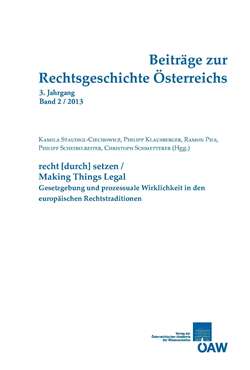
Beiträge zur Rechtsgeschichte Österreichs 2 / 2013, pp. 494-501, 2014/01/30
recht [durch] setzen - Making Things Legal.
Gesetzgebung und prozessuale Wirklichkeit in den europäischen Rechtstraditionen

The ideal of justice played an important role in sixteenth century England, but the legal system could be difficult to navigate even for the most adept, let alone for those without the advantages of wealth, education or political connections. Most people were not legal experts, but a striking feature of life in early modern England was that a very wide section of society was able to gain access to legal advice from a variety of sources, whether professional or otherwise. With the help of such advice, a larger number of people than one might expect were able to make use of the legal system and gain redress for their grievances. Focussing on the Thames Valley in the mid sixteenth century, this article explores the rhetoric and reality of access to justice. As in all societies, ignorance, poverty, inertia and corruption impeded the realisation of any ideal form of justice, but for many people in sixteenth century England the reality was at least close enough to the ideal to be recognisable as such.